Proof of customary law in Nigeria: A custom is a rule in a particular district, which has from long usage obtained the force of Law in that district. For example, in Obe community, it’s only the first son that can be a King, this rule that marks the requirement for being a King in Obe community; from it’s Long usage qualifies as the custom of Obe community.
It is worthy to note that it’s not every Custom that qualifies as a Customary Law. For a Custom to qualify as a Customary Law, it must fulfill the validity test of Customary Law.

Also see: Characteristics of customary law
Validity Test of Customary Law
1. Repugnancy Test: A rule of Customary Law must not be repugnant to Natural Justice, Equity and Good conscience.
Section 18(3) Evidence Act 2011 states that “In any Judicial proceedings where a Custom is relied upon, it shall not be enforced as Law if it’s contrary to Public Policy, or is not in accordance with Natural Justice, equity and good conscience.”
The court has on numerous occasions declared invalid Customs that has failed this repugnancy test. For example, in Ukeje v Ukeje the Supreme Court held that a Custom denying women the right to inherit the father’s property is invalid, in Okonkwo v Okagbue a custom which allows a woman to be married to a dead man was declared invalid, in Uro v Iro a custom denying women the right to give evidence in relation to a Land subject of Customary Occupancy was declared invalid, in Meribe v Egwu a custom allowing women to women marriage was declared invalid, in Guri v Hadejia N.A a custom denying a person accused of armed robbery the right to defend himself was declared invalid as it is contrary to Natural Justice, Equity and Good Conscience.
2. Incompatibility Test: Various High Court rules enabling the application of Customary Law provides that a rule of Customary Law which is incompatible either directly or by necessary implication, with any Law for the time being in force cannot be observed or enforced by the Courts.
This simply means that where there is an existing legislative enactment, and there is a Custom contrary to that existing Legislative enactment, such Custom is invalid. For example, in Agbai v Okogbue the plaintiff’s sewing machine was seized because he failed to pay the development levy for the purpose of building a health center in his village. The Plaintiff contended that he was not a member of the age grade association because his religion forbids him from joining it.
The Court held that the Plaintiff is entitled to the tenets of his religion and the Custom which translates the Plaintiff as an automatic member of the Umunkalu age grade association, without his consent is compatible directly with the provisions of Section 38 1999 Constitution which provides for right to freedom of thought, conscience and religion.
Also see: Sources of Nigerian Laws
3. Public Policy Test: Section 18(3) Evidence Act provides that any Custom relied upon shall not be enforced as Law if it is contrary to Public Policy.
A Custom is contrary to Public Policy where it is injurious to the public interest or welfare of the people. For example, a Custom in Nigeria promoting promiscuity, discrimination because of circumstances of birth, lesbianism and gay marriage is against Public Policy.
As such, where a custom is against Public policy, it will not be enforced by the Court nor relied as an evidence. However, where a custom fulfills this Public policy test, incompatibility test, and Repugnancy test, such custom qualifies as a customary law and may be relied upon as an evidence or proof in Court.

Also see: Differences between Cross-offers and counter-offers
Proof Of Customary Law in Nigeria
The proof of Customary Law is into two folds: Proof before Customary Courts and Proof before non- customary Courts.
Proof of Customary Law before Customary Courts: Where a Custom is to be proved before a Customary Court within the area of Jurisdiction of that community, the president or judge of the customary Court is deemed to know the law and as such evidence is not required to prove the custom.
For example, if there is a dispute arising in Obe Community and such dispute is taken to the Customary Court situated in Obe for settlement, the Judge or President of that Customary Law in Obe is deemed to know the Customary Law of Obe Community and as such, does not demand for evidence in proof thereof.
However, where there is no Customary Court in Obe community and the dispute is taken to a Customary Court in another community (outside the area of Jurisdiction of Obe) the Judge may require the calling of evidence to prove such Custom.
In the case of Ababio v Nsemfo (1947) 12 W. A.C.A 137 where the Court held that in a Customary Court, proof of Customary Law is not necessary where the person presiding over the Court is member of that community and he is versed in Knowledge of the Customs of the Land. Thus, where the presiding judge is not a member of the community, nor is versed in their Custom; proof of evidence may be required.
Also see: Exceptions to Nemo dat quod non habet rule
Proof of Customary Law before Non- Customary Courts: Non- Customary Courts in this context refer to Courts other than the area or customary Courts, such as the Magistrate Court, High Court, Court of Appeal, and Supreme Court.
Section 16(1) Evidence Act 2011 provides that a Custom may be adopted as part of the Law governing a particular set of circumstances if that Custom can be Judicially noticed or can be proved to exist by evidence.
This provision of the Evidence Act establishes two methods of proof of a Customary Law before a Non- Customary Court. These methods are: By Judicial notice and By Evidence.
Judicial Notice: Section 17 Evidence Act states that a Custom may be Judicially noticed when it has been adjudicated upon by a superior Court of record.
Thus, where the Court has ruled on a particular Custom, it is said to have been Judicially noticed and requires no further prove. For example, if there is a dispute relating to the entitlement of a female child to the property of her deceased father, and the custom says the same, but male in the family argue otherwise, that custom alleged to allow the female child to inherit her father’s estates need not to be proved in Court as the court will take judicial notice of the decision in the adjudicated case of Ukeje v Ukeje where the supreme Court held that a female child is entitled to the property of her deceased father and a custom that is to the contrary is invalid.
Also see: Differences between 1960 and 1963 constitution of Nigeria
Proof by Evidence: Section 18(1) Evidence Act 2011 provides that where a custom cannot be established as one Judicially noticed, it shall be proved as a fact.
This therefore means that where a Custom has not been adjudicated by a superior Court of record, such custom is to be proved as a fact before a Non-Customary Court. Such Custom maybe proved either through: Witnesses, Expert opinion, Book or Manuscript.
Witnesses: Section 16(2) Evidence Act 2011 states that the burden of proving a Custom shall lie on the person alleging it’s existence. So if for instance, I am alleging that the Custom of Obe Community does not allow a female child to inherit the property of her deceased father, I have to prove that such Custom exists, and one of the ways I can prove it is by calling Witnesses who are vast with the Custom of Obe community.
Expert opinion: Section 68 Evidence Act 2011 provides for the opinion of persons specially skilled and highly knowledgeable in Customary Law to be admissible when the Court has to form an opinion upon a point of Customary Law. Such expert opinion may include: the evidence or opinion of Native Chiefs, historians, Book authors, Traditional Ruler and any other person having special knowledge of the Customary Law and Custom.
Books or Manuscript: Section 70 Evidence Act states that “ In deciding questions of Customary Law and Custom, the opinions of traditional rulers, chief, or other person’s having special knowledge of the Customary Law and Custom and any book or Manuscript recognized as a Legal Authority by people indigenous to the locality in which such Law or Custom applies, are admissible.”
For example, in Ibrahim v Barde, the Court held admissible a book, which according to some witnesses is regarded in Suleja as an authentic account of the history and culture of the people of the area. Also, in Oyelowo v Oyelowo (1987) 2 NWLR, Pt 56 p. 239, the Court relied on the Nigerian Land Law book by Professor Ben Nwabueze (SAN).
Also see: Differences between civil service and public corporation
In conclusion, a Customary law is in the first instance a matter of fact to be proved before the normal Courts, while before an area or Customary Court, whether it is a matter of fact or whether it can be Judicially noticed depends on whether it is a Custom within the area of Jurisdiction of the Court or not.

Edeh Samuel Chukwuemeka, ACMC, is a lawyer and a certified mediator/conciliator in Nigeria. He is also a developer with knowledge in various programming languages. Samuel is determined to leverage his skills in technology, SEO, and legal practice to revolutionize the legal profession worldwide by creating web and mobile applications that simplify legal research. Sam is also passionate about educating and providing valuable information to people.
Well explained with judicial and statutory authorities.